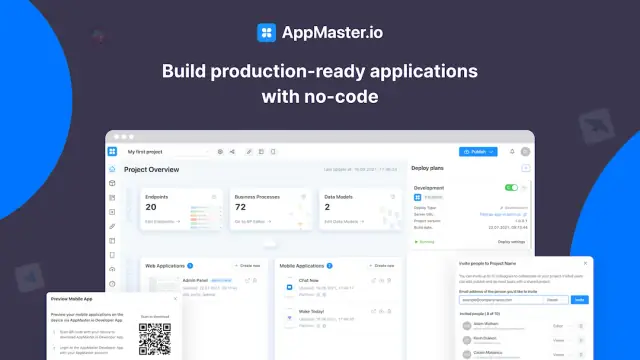5 Ways Chatbots Can Generate More Leads for Your Business
Discover how chatbots enhance lead generation for businesses. Learn the top 5 approaches for leveraging AI assistants to drive customer engagement and growth.

As the business world becomes increasingly competitive, companies always look for innovative strategies to attract and retain customers. Lead generation, a crucial aspect of any successful business endeavor, involves identifying potential customers and converting them into someone interested in your products or services. This is where chatbots — intelligent digital assistants capable of simulating human conversation—come into the spotlight.
Chatbots are not just about customer service; they are an incredibly powerful tool in the marketer’s arsenal. With the rise of artificial intelligence and machine learning, chatbots have become more sophisticated, interacting with users in a personal and human-like way. Their ability to engage with customers, answer queries, and collect valuable data makes them an ideal tool for lead generation. In this technology-powered era, businesses that capitalize on chatbot technology can significantly enhance their marketing efforts, increase efficiency, and drive growth.
Why chatbots for lead generation? They are available 24/7, enabling businesses to interact with prospective customers at any time of the day without the need for human intervention. This round-the-clock engagement means that no lead goes unnoticed or unattended. Moreover, chatbots can handle many conversations simultaneously, ensuring that each potential lead receives instant attention, further optimizing lead conversion chances.
Incorporating chatbots into your lead generation strategy can open up a new realm of possibilities. Whether it's through interactive conversations that build relationships, intelligent screening processes that qualify leads, or seamless integration into existing CRM systems, chatbots can significantly contribute to an effective lead generation strategy. As we progress further into this discussion, we'll explore specific strategies where chatbots can make a tangible difference in generating more leads for your business and how platforms like AppMaster empower you to easily leverage this technology.
Personalized Customer Interactions
Personalized customer interactions are crucial in achieving a competitive advantage in today's market. This personal touch can be the deciding factor for customers choosing between many options. Chatbots stand out as an extraordinary tool for delivering personalized experiences at scale. Here’s how they revolutionize customer interactions:
Understanding Customer Preferences
Modern chatbots are powered by AI and machine learning algorithms, enabling them to learn from each interaction. They recognize patterns in customer behavior and preferences, which allows them to tailor subsequent conversations to suit individual needs. Whether it’s recommending products based on past purchases or addressing customers by name, chatbots make users feel understood and valued.
Conversational Memory
Chatbots can retain information from previous interactions, creating a continuous dialogue with customers. This 'memory' ensures that the conversation does not reset with each interaction, providing a sense of continuity and recognition. Customers don't have to repeat themselves, saving time and reducing frustration.
Interactive Product Guidance
Chatbots act as virtual shopping assistants, guiding customers through the selection process with questions that home in on the best choices for them. This interactive approach educates customers about the offerings and simplifies the decision-making process, driving conversions by assisting customers until they are ready to make a purchase.
Dynamic Responses
Instead of generic, scripted responses, AI-infused chatbots can generate dynamic replies that adapt to the context of the conversation. They can convey empathy and humor where appropriate, making the conversation feel more human and engaging.
Proactive Engagement
Through analyzing user behavior and triggers, chatbots can proactively start conversations at moments likely to generate interest. For instance, if a customer is lingering on a webpage without making a move, a chatbot can initiate contact, offer assistance, or provide discounts to prompt action.

Platforms like AppMaster enable businesses to harness the power of chatbots without extensive programming knowledge. Using a no-code approach, businesses can design chatbots that assist in seamless lead generation and ensure that each customer’s experience is as personal and engaging as possible. In turn, these personalized interactions are lead-generating tools and contribute significantly to customer loyalty and brand reputation.
24/7 Availability and Instant Responses
One of the defining strengths of chatbots in a business context is their unwavering availability. Chatbots do not adhere to the standard nine-to-five work schedule, unlike human employees. They operate tirelessly around the clock, offering instant responses to queries at any time of day. This non-stop service capability directly translates into more lead-capturing opportunities.
Consider a potential customer who visits your website after business hours, only to find no one available to chat with. This scenario could mean a lost opportunity, as the visitor may not return. Contrast this with a website equipped with an effective chatbot — regardless of the hour, the visitor engages with an always-ready assistant, ensuring an immediate touchpoint that fosters trust and reliability.
The pace at which chatbots can field questions and provide information is also paramount. In our fast-moving world, consumers expect quick results. A chatbot's ability to deliver instant, automated responses to frequently asked questions satisfies this expectation and keeps the user's attention focused on your offerings. The quick interaction also creates a smooth user experience that positively impacts the perception of your brand.
Furthermore, chatbots can manage a vast number of conversations simultaneously. This scalability means that no matter how many people visit your online platforms, each one can receive personal attention without any delays. As a result, your business avoids the bottlenecks that can often occur with human-operated live chat systems and call centers during peak times.
While chatbots provide 24/7 service, they also play a crucial role in overcoming the challenges posed by time zones in global markets. Being immediately available to international visitors can significantly enhance customer satisfaction and increase the chance of converting leads worldwide.
Platforms like AppMaster enable businesses to implement such valuable chatbot functionalities with ease. The no-code approach offers a practical solution for businesses to deploy chatbots without the need for an extensive technical team, making high-quality customer service and lead generation accessible and manageable.
Qualifying Leads with Intelligent Screening
Lead qualification is crucial in the sales process, determining which potential customers are most likely to convert into sales. Intelligent screening through chatbots offers an efficient and automated approach for sorting through leads to identify the most promising prospects. By implementing chatbot technology, businesses can employ sophisticated algorithms and predefined criteria to assess the interest level, purchase intent, and fit of each interaction that occurs on their digital platforms.
Chatbots are intricately designed to ask the right questions conversationally, engaging users while seamlessly collecting vital information. They can inquire about users’ needs, budget, timeline, and specific preferences. This interactive screening form creates a more dynamic experience for the user while providing the business with qualitative data. Unlike static forms, a chatbot can adapt its line of questioning based on previous answers, digging deeper into responses that indicate a higher potential for sales conversion.
Moreover, intelligent lead qualification chatbots can score leads in real-time, using a set of weighted questions and answers to rank leads according to their sales-readiness. Low-scoring leads may be directed to nurturing campaigns, whereas high-scoring ones could be immediately flagged for follow-up by the sales team. This prioritization ensures that sales efforts are focused where they are most likely to yield returns.
An invaluable advantage of using AI-driven chatbots is their ability to learn from each interaction. Over time, machine learning algorithms can become more sophisticated in identifying the nuances that indicate a quality lead. They continuously refine their questioning tactics and lead scoring models based on successful conversions, which can significantly enhance the efficiency of the lead generation process over time.
Integration with other business systems is another significant benefit. Chatbots can be connected to customer relationship management (CRM) systems and marketing platforms, automatically updating lead statuses and syncing lead information across all customer touchpoints. This saves time on data entry and informs all relevant stakeholders about each prospect's journey, ensuring no lead is lost in the shuffle.
To ensure that the chatbot's lead qualification strategy aligns with a company’s sales goals, businesses must clearly define the qualification criteria. Defining these criteria entails understanding the attributes of an ideal customer and setting thresholds for what constitutes a qualified lead. For instance, an enterprise software company might prioritize leads from certain industries or company sizes, while an online retailer might be more concerned with interest in particular product categories.
No-code platforms, such as AppMaster, simplify the task of creating such smart chatbots. With an intuitive interface, businesses can define the logic for their chatbot's interaction flows and lead qualification criteria without needing a deep technical background. Updating the chatbot as the business evolves or as new insights are gained becomes just as straightforward, ensuring that the lead qualification processes remain optimized over time.

Chatbots with intelligent screening algorithms transform lead qualification into a more proactive, engaging, and data-driven process. By effectively leveraging AI to vet and nurture leads, businesses can allocate their resources more strategically, enhancing conversion rates and customer satisfaction.
Seamless Integration with Sales Funnels
Chatbots aren't just a tool for conversation; they are a pivotal component in a strategic sales funnel. By embedding chatbots at various stages within the funnel, businesses can guide potential customers from the awareness phase to purchasing with minimal friction. One of the greatest strengths of chatbots is their versatility in adapting to different stages of the customer journey.
At the top of the funnel, chatbots can initiate contact with prospects by answering basic queries or providing helpful content that raises awareness about a product or service. This interaction is essential in building interest and trust while collecting initial data about the prospect, such as their needs and preferences.
Moving down the funnel to the consideration stage, chatbots can offer more detailed information and personalized recommendations based on collected data. They can assist users in comparing different options or services, highlighting the benefits that align with their specific pain points. This targeted approach helps nurture leads and prepare them for conversion.
In the decision-making stage, chatbots become even more crucial. They can facilitate purchasing by offering discounts, scheduling demonstrations, or connecting the prospect with a sales representative. For service-based businesses, chatbots can book consultations or appointments, making it easier for leads to take the next step towards becoming customers.
Throughout the entire sales process, chatbots are capable of not only advancing leads through the funnel but also of re-engaging potential customers who may have dropped out. They can send follow-up messages, reminders for abandoned carts and offer assistance to resolve concerns that might prevent a sale.
Finally, chatbots’ integration with CRM systems and other sales tools enables a seamless transition of lead data to the sales team. Vital information collected by the chatbot can be used for follow-ups and ongoing customer relationship management, thus ensuring a coherent customer experience across all touchpoints.
Implementing chatbots into sales funnels can often require some customization to align with a company's specific sales strategy. No-code platforms like AppMaster allow businesses to design and integrate chatbots that perfectly fit their sales funnel needs without investing in costly custom software development.
Collecting and Analyzing Customer Data
Modern businesses thrive on data. It's the cornerstone of any strategic marketing or sales initiative, and chatbots are particularly adept at collecting and analyzing this vital resource. How do they manage this, and more importantly, how can your business benefit from these capabilities?
Firstly, chatbots are excellent at gathering data through interaction. Every question they ask, every response they receive, and every user interaction is a data point that can be leveraged. This is especially important when understanding your audience's needs, preferences, and pain points. Through natural language processing and machine learning, chatbots can identify trends, and common issues, and even anticipate customer needs before they are explicitly stated.
This data trove is not just limited to improving chatbot interactions. When synchronized with your CRM or any marketing software, it can revolutionize how you approach your sales strategy. Chatbots can tag and categorize data effectively, enriching customer profiles and allowing you to personalize future interactions based on solid data. Targeted marketing becomes more effective when you understand exactly who you're talking to and what they're looking for.
Analysis doesn't stop at collecting data; it's about turning data into actionable insights. AppMaster's no-code platform can be utilized here, as it provides the tools to create chatbots and widgets and dashboards that process and display this data in real-time. You can monitor chatbot conversations, get an overview of lead generation performance, and identify areas for improvement quickly and efficiently.
The data-handling capabilities of chatbots are like having a 24/7 digital marketer who continuously learns and optimizes for better engagement with your audience. When paired with powerful analytics tools, your chatbot can become an indispensable part of your lead generation arsenal, ensuring your business stays data-driven and ahead of the curve.
FAQ
Chatbots can offer personalized interactions, responding to customer queries in real-time and maintaining engagement around the clock. By understanding user preferences and behaviors, chatbots can tailor conversations to the individual, improving the user experience and the likelihood of converting leads.
Yes, one of the key benefits of chatbots is their 24/7 availability. Regardless of time zones or business hours, chatbots can engage with potential leads, offer instant responses, and maintain a continuous presence that increases opportunities for lead capture.
Chatbots are equipped with intelligent screening capabilities which allows them to ask relevant questions and assess a lead's potential. This helps in prioritizing leads based on their likelihood of conversion, ensuring that sales teams can focus on high-quality prospects.
Chatbots can be seamlessly integrated into various stages of the sales funnel, from initiating contact to nurturing leads. They can provide information, redirect users to sales pages, schedule appointments, and ensure leads are matured through the funnel efficiently.
Chatbots can collect user information through conversations, forms, and feedback. This data can be tagged and analyzed to improve customer profiles, personalize future interactions, and guide business strategies for enhanced lead generation.
Absolutely. By analyzing previous interactions and collected data, chatbots can make personalized product or service recommendations that cater to the specific needs and interests of each user, increasing the likelihood of lead conversion.
Setting up a chatbot has become increasingly user-friendly, especially with platforms like AppMaster which offer no-code solutions. Such platforms enable business owners to design and implement chatbots without extensive technical background.
Chatbots can be a cost-effective solution for lead generation, as they help save on labor costs and increase efficiency. While there can be initial setup and maintenance expenses, no-code platforms can reduce these costs considerably.
For inquiries that are too complex for a chatbot to handle, they can be programmed to escalate the query to a human representative. This ensures that customers are satisfied and high-quality service is maintained.
Chatbots are versatile and can be customized to suit a wide range of business needs. From small startups to large enterprises, businesses across industries can benefit from implementing chatbot solutions.





